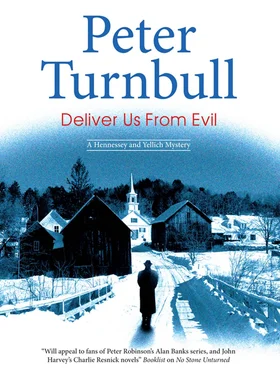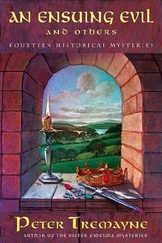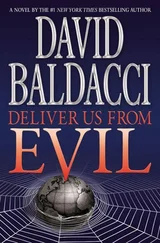Peter Turnbull - Deliver Us from Evil
Здесь есть возможность читать онлайн «Peter Turnbull - Deliver Us from Evil» весь текст электронной книги совершенно бесплатно (целиком полную версию без сокращений). В некоторых случаях можно слушать аудио, скачать через торрент в формате fb2 и присутствует краткое содержание. Жанр: Полицейский детектив, на английском языке. Описание произведения, (предисловие) а так же отзывы посетителей доступны на портале библиотеки ЛибКат.
- Название:Deliver Us from Evil
- Автор:
- Жанр:
- Год:неизвестен
- ISBN:нет данных
- Рейтинг книги:4 / 5. Голосов: 1
-
Избранное:Добавить в избранное
- Отзывы:
-
Ваша оценка:
- 80
- 1
- 2
- 3
- 4
- 5
Deliver Us from Evil: краткое содержание, описание и аннотация
Предлагаем к чтению аннотацию, описание, краткое содержание или предисловие (зависит от того, что написал сам автор книги «Deliver Us from Evil»). Если вы не нашли необходимую информацию о книге — напишите в комментариях, мы постараемся отыскать её.
Deliver Us from Evil — читать онлайн бесплатно полную книгу (весь текст) целиком
Ниже представлен текст книги, разбитый по страницам. Система сохранения места последней прочитанной страницы, позволяет с удобством читать онлайн бесплатно книгу «Deliver Us from Evil», без необходимости каждый раз заново искать на чём Вы остановились. Поставьте закладку, и сможете в любой момент перейти на страницу, на которой закончили чтение.
Интервал:
Закладка:
Peter Turnbull
Deliver Us from Evil
ONE
Wednesday, March twenty-fifth, 08.35 hours — 14.37 hours in which a chilled discovery is made and a murder is announced.
Tranquillity. That was the word. He thought the word to be ‘tranquillity’. It was the only word to describe the panorama.
Everything seemed to him to fit perfectly. It seemed to the man that it all fitted so neatly and so beautifully together, like a high quality jigsaw puzzle or a well executed landscape painting. Everything gelled. Nothing jarred. Nothing was out of place. The overriding impression and indeed, he believed, the overall actuality was one of peace and stillness combined. It was, he pondered, quite possible to have peace without stillness and it was equally possible to have stillness without a sense of peace, as in the approach of, and aftermath of, violence, but here, now, was both peace and stillness combined. Tranquillity.
The water first. The water in the canal, dull, grey, dark grey, utterly uninviting in itself, was still, a smooth, mirror-like surface, so still that it could in other circumstances be mistaken for a solid. It was not disturbed by a solitary ripple or wash, by a bird landing upon it, nor a pebble wantonly thrown. There was, observed the man, a certain depth, a certain maturity about the placidity of the canal water, in that because there had been no wind in the night, nor during the previous day, the water had fully settled over time into a great calm. So it seemed to the observer.
Then, secondly, there was the ribbon of land at either side of the canal. Again, also so still, the coal black towpath glistened with isolated frozen droplets of water amid the grit, and the close cropped vegetation at both sides of the towpath was covered with a thick layer of hoar frost. It was solid, stiff, unmoving. A very late frost for the time of year, but nonetheless it was a frost-encased landscape which, like the canal, seemed to the man to be gripped with a stillness that was greater, deeper somehow, than the state caused by a simple absence of movement. The flat fields beyond the canal, surrounding it, were similarly covered in a thick layer of frost, as were the clipped hedgerows which enclosed the fields.
And, thirdly, there was the sky. A great sheet of low, grey cloud that covered the scene from skyline to skyline to skyline through 360 degrees, and with no clear, definite boundary determining where land ceased and the sky began. That was the scene which met the man and reached his soul and it was the scene which imprinted itself indelibly upon his memory. It was also the landscape wherein the stillness was compounded by the silence. No bird sang. There was no distant lowing of cattle, and, it being the early twenty-first century, no unseen aircraft was to be heard flying overhead and there was no distant rumble of traffic. Perfect stillness, and also a silence so profound that the man believed he could verily hear it, for silence, he believed, does have a sound.
The woman also seemed, to the man, to gel smoothly with the calm, silent, white landscape. She was still; utterly motionless, making no sound. He had first seen her from a distance of perhaps one quarter of a mile, noticing first her dark hair which stood out against the background, the remainder of her being well camouflaged by the long white coat and the white slacks beneath the coat and by the flimsy white stiletto heeled shoes she wore. Not, in the man’s view, particularly sensible clothing or footwear to be walking in. In such conditions one’s survival might depend upon one being conspicuous. Dark clothing in a white landscape, high visibility clothing at night, or when out on the hill, that was the rule. And kit to suit the purpose; that was also the rule. The woman increased her level of camouflage by being still, as totally devoid of any movement as her environment. The man had learned early in life that being still, just standing or sitting motionless is, in itself, a very effective form of camouflage. He had often seen how just the slightest movement can betray the presence of something, man or beast or fowl, sometimes something very large and which would otherwise have gone completely unnoticed. He later thought that, had it not been for the dark hair, distinct like a black dot on a white background, he might not have seen her until he was just a few feet distant, she being so rigidly stone-like. The woman, he noticed, sat on the coarse grass bank of the canal with the towpath between her and the water, just staring out across the flat morning landscape of the Vale of York. The man steadily approached the woman and as he did so, made the decision to contaminate the silence by deliberately treading on the grit on the towpath so as to create a little sound. Even though he was approaching from the side of the woman he felt it did not do to come upon her without advertising his presence. He was loath to pick up a stone and throw it into the water ahead of him, knowing that the splash would, in that state of natural serenity, be easily heard by the woman if she was of normal hearing, but stepping from the grass on to the towpath and thus causing the soles of his hiking boots to ‘crunch-crunch-crunch’ upon the loose grit was, he thought, sound sufficient and a sensitive announcement of his presence.
The woman, however, did not turn at the sound of his footfall as he had fully expected her to, in fact she did not move at all but continued to remain sitting upright with slightly bent legs and hands resting together in front of her, staring with wide eyes across the patchwork of flat, whitened fields. As the man slowly, and with growing curiosity, approached the woman, something caused him to halt, to stop in his tracks. For a few seconds there was just him and her and the stillness and the silence. He then, with growing concern, broke the silence by saying with a slightly raised voice, to ensure that it carried the ten or fifteen feet which separated them, ‘Good morning,’ and the instant that he said it he realized that he was looking at the first corpse he had seen.
The man had, in recent years, often thought that it had been quite an achievement for him to have reached his mid sixties without ever having seen a dead body. He had avoided military service and had gone on to lead a pleasingly quiet life. His two older brothers had undertaken the unpleasant duty of identifying first their deceased father, and some time later, after years of pining, the corpse of their mother. So that all he had seen of his parents upon their death were highly polished pine coffins being carried into a church, then each out again before being lowered into a neatly dug hole. He was a man wholly appreciative of and grateful for his achievement, though he conceded that ‘achievement’ might not be the correct word. His ‘good fortune’ might, he thought, be better, and a more appropriate description. Not for him warfare or survival in a war zone, nor fighting for his life amid dreadful natural disasters of hurricane and flood and fire, but a quiet life, unadventurous, unimaginative, sometimes mind-numbingly routine, and now it was as if some greater power had deemed that he was not going to escape the experience that was the lot of so many millions worldwide. Here was a dead body for him to gaze upon and yet who, despite being deceased, was nonetheless wholly in keeping with her surroundings. A woman in her early middle years, who had just the slightest trace of a smile about her mouth and who also displayed a look of peace. It all seemed to gel, as he had at first thought, so utterly completely, like a jigsaw puzzle. Not a piece missing nor out of place.
The man quickly glanced at his watch: eight thirty-five hours. He did so because he thought the time of his discovery might be of some significance. He walked on with a profound sense of reverence as he passed the corpse, even though it might seem that he was leaving the seated woman to her reveries, but the onward path was known to the man as being the speediest route to the nearest public telephone.
Читать дальшеИнтервал:
Закладка:
Похожие книги на «Deliver Us from Evil»
Представляем Вашему вниманию похожие книги на «Deliver Us from Evil» списком для выбора. Мы отобрали схожую по названию и смыслу литературу в надежде предоставить читателям больше вариантов отыскать новые, интересные, ещё непрочитанные произведения.
Обсуждение, отзывы о книге «Deliver Us from Evil» и просто собственные мнения читателей. Оставьте ваши комментарии, напишите, что Вы думаете о произведении, его смысле или главных героях. Укажите что конкретно понравилось, а что нет, и почему Вы так считаете.












